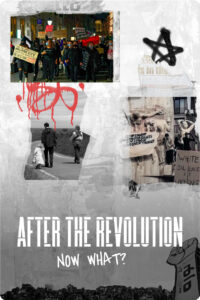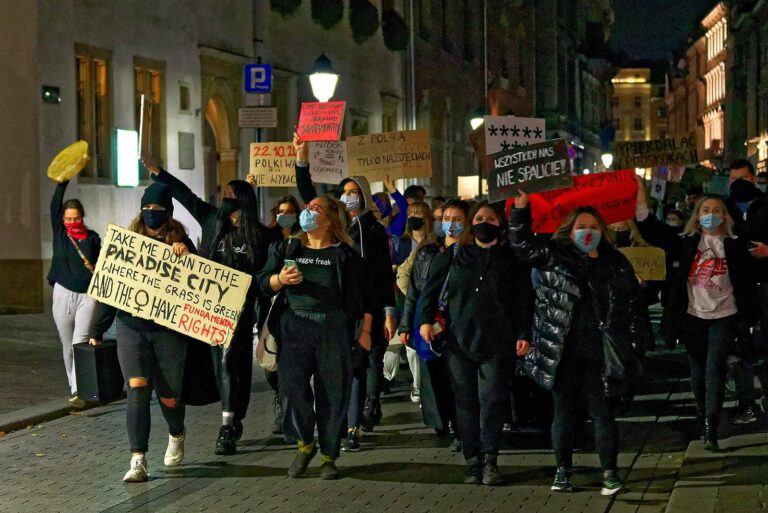A broad park stretches on the opposite side of a downward road. It’s a beautiful day; the sky is clear, the air is soft. A small, colorful coffee shop stands nearby. Inside, songs by Gorillaz and La Femme are playing. The outdated image of Warsaw being a gray, communist city has been blown by a wind of banana bread and oatmeal cookies. The center of the Polish capital looks trendy, Anglo-inspired.
The café was the place Natalia Broniarczyk chose for our meeting. She just returned from holiday and starts off by apologizing:“Between the jet lag and the flight, I’m very tired. I hope I will be able to answer your questions properly. Sorry it took me so long to reply, about the meeting.”The young woman looks weary, and the twinkle in her clear eyes dims again.“I came home to bad news.”It was waiting for her in her mailbox: a letter from the police. She has to call them today to ask precision about what they want from her, and she is quite nervous about it. Her colleague and friend Justyna Wydrzyńska is currently facing trial, accused of having helped a woman to get an abortion. On the day of our meeting, they are preparing a third hearing. Since then, the trial was postponed again, and the next hearing scheduled for January 11th 2023.
I had never been an activist before; I wondered why abortion was taboo, but it remained theoretical. I became pregnant in 2017, it became personal, and the personal is political
In the last few years, more restrictive laws on abortion have been flourishing. After battles won and successful feminist revolutions, now comes a time of stalemate, or even of going backward. Just like the United States, Poland is among the countries that retrogress. Katarzyna Swed is part of a group of lawyers who stand in favor of legalizing abortion. She explains that, until 1993, women were free to have an abortion in Poland. It wasn’t until recently that such right was narrowed down little by little.
“Every day, 4 Polish individuals go get an abortion in foreign countries. Every day, at least 90 persons have a medical abortion. In Poland, in the context of enforcing the anti-abortion law, 107 abortions were carried out in public hospitals in 2021.”This Facebook post published by the Aborcyjny dream team association evidences the current difficulties in accessing abortion. Natalia and Justyna founded this organization to fight for women’s right to have an abortion freely and safely. According to Justyna, in 2021, 34000 individuals reached out to the association, who helped 1500 of them to go get an abortion abroad.
In Poland, a proper support system came together to make sure that pregnant individuals would access help anytime. The aim is not necessarily to go to the point of abortion every time, but rather to give people the information they might need so they can make a free and informed choice.“We deserve to receive accurate information. When it happens to us, we are alone, and that shouldn’t be the case”.
Justyna speaks from experience. Like many other activists, her commitment started when she experienced such obstacles first hand.“Everything began with my own abortion. I was a mother to three children, one of those “normal people” with a job, hobbies, etc. And just after that abortion, I started helping other women. Because I had seen how difficult it had been. I did not have access to any information and it was impossible for me to go abroad. I knew abortion pills existed, but I didn’t know where I could find reliable advice”.
When Natalia had to make a decision, she was much more informed. She was notably working on gender studies. However, theoretical knowledge and deciding for yourself are two different things. “In 2011, I was undergoing an unwanted pregnancy. I realized that, even though I was among the people who gave others advice about their sexual health, and even though I knew everything about birth control, I had no idea what to do about that pregnancy.”
Gosia, on the other hand, never had an abortion. Nevertheless, it was her pregnancy that marked a turning point. Currently based in Berlin, she is part of the liaison group that takes care of women who come from Poland to Germany, to make sure the solidarity chain doesn’t break. “I wasn’t an activist before that; I used to wonder why abortion was taboo, but it was all theoretical. When I got pregnant in 2017, it became personal, and what is personal is political. I was happy, and now I’m happy to be a parent. During the pandemic, I had free time, and with the new law in Poland, I wanted to help. I never had an abortion myself, but I could imagine how it’d feel.”
A majority of them are caregivers, and their commitment takes place in the field of volunteering. “It is not always easy,” Gosia admits, “sometimes it’s too much. It takes up to several hours each day and you have to be ready to handle every kind of situation. Sometimes the telephone won’t stop ringing”. Only Natalia now works as an employee. Her fight became her job.. “It had become too much to combine my time as a volunteer with my career as a professor, I left the faculty in December 2021” she explains.
In Poland, a genuine network has been established to support pregnant individuals at all times. The goal is not necessarily to proceed to abortion, but to enable individuals to seek information to make a free and informed choice
On the other side, women who are in need of assistance can reach out to them anytime. It all begins with a phone call or an email. The entry point can be Abortion without Borders, an organization that was founded in 2019 and comprises 6 entities with the aim of “providing information and support, including financially, to Polish people who want to abort, either in Poland or abroad, with the abortion pill.” Gosia explains that privacy and intimacy are very much respected throughout the procedure. “We do not ask for details about their situation, only information that is needed to offer appropriate advice.” Many people just call to ask for information. Others want to get an abortion but do not know how to do it. When they have to go abroad, the associations organize the trip. Once on site, other arrangements are made. Interpreters, people who offer accommodation at their place for one or several nights, healthcare professionals, they all answer the call along with those who handle the logistics.
The activists also have to juggle with the different laws. Indeed, once they help pregnant individuals out of the country, they must refer to the law of the chosen destination. Which isn’t always as flexible as you might think. In Germany, for instance, abortion isn’t technically legal. Several exceptions exist, such as when the mental or physical health of the pregnant individual is threatened. Abortion is also possible during the 12 first weeks of pregnancy if two obligations are fulfilled: to attend a mandatory session of counseling with a professional, and to wait three days between this consultation and the procedure.
Depending on each case, it can therefore be easier to abort in Poland. “To order pills for a medical abortion is not an infraction. Only the people who help others get an abortion are prosecuted. The goal is to have us abort alone and feeling ashamed” Justyna.
Help us tell the world to you !
Frictions is launching its club : by supporting Frictions, you’ll be supporting a community of authors and journalists who tell the world through intimate stories!

Katarzyna clarifies this legal point. According to the Polish law, people who abort or possess abortion pills are not committing a criminal offence. What is criminalized is the action of buying those pills with the purpose of putting them on the market. But the line between what is considered legal and what constitutes an offence can be thin. This gray zone is what enables volunteers to keep on helping, but its opacity is also dangerous, because the sword of justice can then fall arbitrarily. Such militant involvement is thus risky, as evidenced by the prosecution against Justyna. The woman who reached out to her for help wanted to go to Germany. She had to give up on the idea after being threatened by her partner. Justyna tells us how she subsequently sent the woman her own pills. The husband found out and was the one who called the police to report them.
Justyna faces 3 years of imprisonment. “I’d be lying if I said I wasn’t afraid,” she admits, but it is not enough to make her bend. During her audition last October, she responded to interrogations: “I don’t feel guilty at all. I believe I did something right”.
© photo : J. Halun









